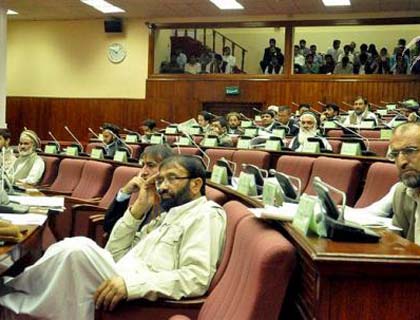KABUL - The Wolesi Jirga's Commission on Internal Security on Saturday insisted President Hamid Karzai's decree dissolving all private security firms had not been fully implemented, an assertion rejected by the Ministry of Interior (MoI).
The house panel summoned Lt. Gen. Abdul Jamil Junbish, the public protection department head at MoI, to brief lawmakers on implementation of the presidential orders issued in August 2010.
The decree ordered private security companies disbanded by the end of that year, drawing a warning from the United States that the move could delay reconstruction and development programs.
The US and its partners rely heavily on private security contractors – both Afghan and foreign – to guard supply convoys and protect key installations and personnel.
According to the decree, the tens of thousands of security contractors had either joined police or ceased operations within four months since it was issued.
The decree provided an exception for private security firms working inside the compounds used by international groups, including embassies, businesses and non-governmental organizations.
"But still many private firms remain operational and they are yet to end their activities," claimed Lalai Hamidi, a member of the commission and a public representative from southern Kandahar province.
He said the presidential decree had not been enforced completely because some of the firms belonged to high-ranking government officials. He did not name anyone.
"These firms belong to those sitting in the Presidential Palace. They are ministers and members of the National Security Council," the lawmaker claimed, without going into details.
He accused some security firms of supplying weapons to the Taliban and threatening the country's security situation.
Hamidi asked the ministry of interior if it could not deal with private firms alone, it should seek support from the Wolesi Jirga's commission on interior security.
Another member of the commission, Nazifa Zaki, a lawmaker from central Kabul province, said Rangin Dadfar Spanta, adviser to the president on national security, had allowed some private firms to operate after Karzai had issued the decree. She did not elaborate.
Her remarks were echoed by Mohammad Saleh, an MP from eastern Kunar province. He said the National Security Council was acting beyond its authority in connection with private security companies.
He also accused private firms of supplying weapons to the rebels, planting mines on roads and playing a key role in deterioration of security in the country.
But Junbish said the decree had been fully implemented. He said there were a total of 109 firms, 57 were declared unlawful and 52 legal.
All the illegal firms had been dismantled and eight of those illegal brought under the ministry of interior framework, he explained. Eight firms that had connections with high ranking officials had been stopped from operating, he added.
He said the remaining 35 firms continued to keep security for embassies and other departments under the Geneva conventions, but their responsibility remained restricted to compounds of the departments concerned.
The official said NSC had agreed to operations of private firms under Geneva conventions. He said there was only one firm left unregulated named Arya which is responsible for security on the Kabul-Farah highway. He added the firm would be brought soon under the ministry's framework.
Junbish asked lawmakers if they found another private firm operational, he was ready to be referred to judicial organs for investigation. (Pajhwok)

